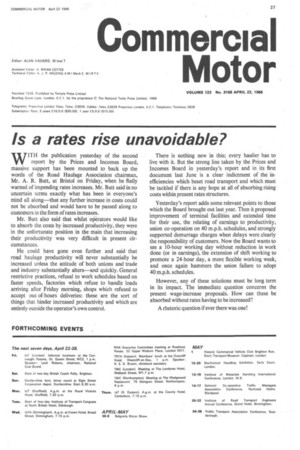Is a rates rise unavoidable?
Page 29

If you've noticed an error in this article please click here to report it so we can fix it.
WITH the publication yesterday of the second report by the Prices and Incomes Board, massive support has been mounted to back up the words of the Road Haulage Association chairman, Mr. A. R. Butt, at Bristol on Friday, when he flatly warned of impending rates increases. Mr. Butt said in no uncertain terms exactly what has been in everyone's mind all along—that any further increase in costs could not be absorbed and would have to be passed along to customers in the form of rates increases.
Mr. Butt also said that whilst °Orators would like to absorb the costs by increased productivity, they were in the unfortunate position in the main that increasing their productivity was very difficult in present circumstances.
He could have gone even further and said that road haulage productivity will never substantially be increased unless the attitude of both unions and trade and industry substantially alters—and quickly. General restrictive practices, refusal to work schedules based on faster speeds, factories which refuse to handle loads arriving after Friday morning, shops which refused to accept out-of-hours deliveries: these are the sort of things that hinder increased productivity and which are entirely outside the operator's own control. There is nothing new in this; every haulier has to live with it. But the strong line taken by the Prices and Incomes Board in yesterday's report and in its first document last June is a clear indictment of the inefficiencies which beset road transport and which must be tackled if there is any hope at all of absorbing rising costs within present rates structures.
Yesterday's report adds some relevant points to those which the Board brought out last year. Then it proposed improvement of terminal facilities and extended time for their use, the relating of earnings to productivity, union co-operation on 40 m.p.h. schedules, and strongly supported demurrage charges when delays were clearly the responsibility of customers. Now the Board wants to see a 10-hour working day without reduction in work done (or in earnings), the extension of shift working to promote a 24-hour day, a more flexible working week, and once again hammers the union failure to adopt 40 m.p.h. schedules.
However, any of these solutions must be long term in its impact. The immediate question concerns the present wage-increase proposals. How can these be absorbed without rates having to be increased?
A rhetoric question if ever there was one!




























































































































